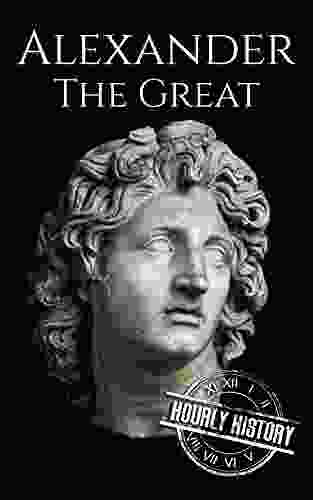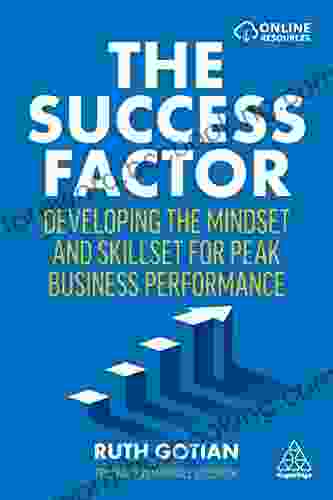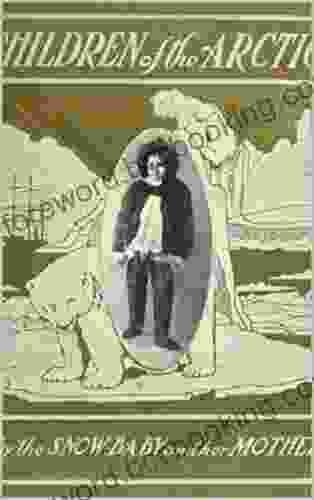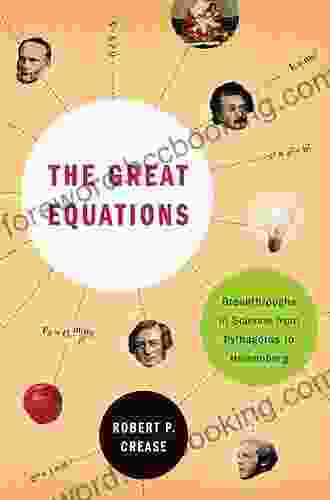Journey Through the Annals of Science: "Breakthroughs In Science From Pythagoras To Heisenberg"


Prepare to embark on a captivating intellectual odyssey as we delve into the groundbreaking scientific discoveries that have shaped our understanding of the universe. From the enigmatic theorems of Pythagoras to the revolutionary insights of Heisenberg, "Breakthroughs In Science From Pythagoras To Heisenberg" offers a comprehensive exploration of the pivotal moments that have propelled human knowledge forward.
4.3 out of 5
| Language | : | English |
| File size | : | 2404 KB |
| Text-to-Speech | : | Enabled |
| Screen Reader | : | Supported |
| Enhanced typesetting | : | Enabled |
| Word Wise | : | Enabled |
| Print length | : | 318 pages |
The Dawn of Scientific Inquiry: Pythagoras and the Pythagorean Theorem
Our journey begins in the realm of ancient Greece, where Pythagoras, a renowned philosopher and mathematician, laid the foundations for scientific inquiry. His eponymous theorem revolutionized geometry, providing a universal formula for calculating the lengths of sides in right-angled triangles. Pythagoras's theorem serves as a testament to the enduring power of mathematics in unraveling the mysteries of our physical world.
The Birth of Astronomy: Nicolaus Copernicus and the Heliocentric Model
Centuries later, Polish astronomer Nicolaus Copernicus shattered the prevailing Ptolemaic model of the solar system. His heliocentric theory asserted that the Earth and other planets revolve around the Sun, not vice versa. This groundbreaking concept overturned centuries of astronomical dogma, paving the way for a more accurate understanding of our place in the cosmos.
The Laws of Motion: Isaac Newton and the Birth of Modern Physics
The scientific revolution reached its zenith with Isaac Newton, the towering figure of 17th-century science. Newton's three laws of motion and law of universal gravitation laid the groundwork for modern physics. His discoveries laid the foundation for understanding the motion of celestial bodies and the forces that shape our universe, forever altering the course of scientific thought.
The Enlightenment: Antoine Lavoisier and the Conservation of Mass
The Enlightenment brought forth a wave of scientific advancements, including the pioneering work of French chemist Antoine Lavoisier. Lavoisier established the law of conservation of mass, demonstrating that matter cannot be created or destroyed during chemical reactions. This fundamental principle revolutionized our understanding of chemistry and paved the way for the development of modern chemical theory.
The Atomic Revolution: John Dalton and the Discovery of Atoms
The 19th century witnessed the emergence of atomic theory. English chemist John Dalton proposed that all matter is composed of tiny, indivisible particles called atoms, each with unique properties. Dalton's atomic theory marked a paradigm shift in science, providing a framework for understanding the structure and behavior of matter.
The Electromagnetic Revolution: Michael Faraday and the Discovery of Electromagnetism
Michael Faraday, a brilliant experimental physicist, uncovered the fundamental principles of electromagnetism. His groundbreaking work on electromagnetic induction revolutionized our understanding of electricity and magnetism and laid the foundations for modern electrical engineering.
The Birth of Quantum Mechanics: Max Planck and Albert Einstein
At the turn of the 20th century, a radical new theory emerged that would forever change our understanding of the atomic world. Max Planck's theory of quantum physics introduced the concept of quantized energy, challenging classical physics's assumptions. Albert Einstein's theory of special relativity further pushed the boundaries of physics, revolutionizing our understanding of space, time, and the nature of light.
The Rise of Nuclear Physics: Ernest Rutherford and Werner Heisenberg
Ernest Rutherford's pioneering work in nuclear physics revealed the structure of the atom. He discovered the atomic nucleus and the concept of radioactive decay. Werner Heisenberg's uncertainty principle, another cornerstone of quantum physics, demonstrated the inherent limitations of measuring the position and momentum of particles simultaneously, opening up new avenues of scientific inquiry.
: A Legacy of Discovery and Innovation
"Breakthroughs In Science From Pythagoras To Heisenberg" serves as a testament to the indomitable spirit of scientific exploration. From the ancient Greeks to modern-day physicists, the pursuit of knowledge has propelled human understanding forward, shaping our world and inspiring generations of scientists to come.
As we stand on the shoulders of these scientific giants, let us continue to embrace the pursuit of scientific discovery, knowing that the journey of human knowledge is an ongoing one, filled with limitless possibilities and the promise of unlocking the secrets of the universe.
4.3 out of 5
| Language | : | English |
| File size | : | 2404 KB |
| Text-to-Speech | : | Enabled |
| Screen Reader | : | Supported |
| Enhanced typesetting | : | Enabled |
| Word Wise | : | Enabled |
| Print length | : | 318 pages |
Do you want to contribute by writing guest posts on this blog?
Please contact us and send us a resume of previous articles that you have written.
 Book
Book Novel
Novel Page
Page Chapter
Chapter Text
Text Story
Story Genre
Genre Reader
Reader Library
Library Paperback
Paperback E-book
E-book Magazine
Magazine Newspaper
Newspaper Paragraph
Paragraph Sentence
Sentence Bookmark
Bookmark Shelf
Shelf Glossary
Glossary Bibliography
Bibliography Foreword
Foreword Preface
Preface Synopsis
Synopsis Annotation
Annotation Footnote
Footnote Manuscript
Manuscript Scroll
Scroll Codex
Codex Tome
Tome Bestseller
Bestseller Classics
Classics Library card
Library card Narrative
Narrative Biography
Biography Autobiography
Autobiography Memoir
Memoir Reference
Reference Encyclopedia
Encyclopedia Gary Webster
Gary Webster Matt Ellis
Matt Ellis Jazz E
Jazz E Harriet Welty Rochefort
Harriet Welty Rochefort Michelle Meagher
Michelle Meagher Hope Ford
Hope Ford Michael Dahl
Michael Dahl Robin Landa
Robin Landa Hektor Thillet
Hektor Thillet Tim Hague
Tim Hague Hernan Chousa
Hernan Chousa Sue Hubbell
Sue Hubbell Simon Beecroft
Simon Beecroft Jeffrey Wilson
Jeffrey Wilson Hollie Bell Schinzing
Hollie Bell Schinzing Heidi Marx
Heidi Marx Harry Bauld
Harry Bauld Henry A Zumbrun 2
Henry A Zumbrun 2 Helena Hunt
Helena Hunt Herb Bryce
Herb Bryce
Light bulbAdvertise smarter! Our strategic ad space ensures maximum exposure. Reserve your spot today!

 Colin FosterAn Introduction to the Life and Music of Charles Ives: Uncover the Enigma of...
Colin FosterAn Introduction to the Life and Music of Charles Ives: Uncover the Enigma of...
 Natsume SōsekiLife From Beginning To End: Unveiling the Extraordinary Lives of Military...
Natsume SōsekiLife From Beginning To End: Unveiling the Extraordinary Lives of Military... Gilbert CoxFollow ·3.7k
Gilbert CoxFollow ·3.7k Logan CoxFollow ·19k
Logan CoxFollow ·19k Steve CarterFollow ·4.8k
Steve CarterFollow ·4.8k Jesus MitchellFollow ·19.3k
Jesus MitchellFollow ·19.3k Denzel HayesFollow ·12.5k
Denzel HayesFollow ·12.5k Preston SimmonsFollow ·13.4k
Preston SimmonsFollow ·13.4k Raymond ParkerFollow ·14.4k
Raymond ParkerFollow ·14.4k John SteinbeckFollow ·2.4k
John SteinbeckFollow ·2.4k

 Fabian Mitchell
Fabian MitchellUnleash the Adventure: Family Fun in the Black Hills
Nestled amidst the rolling hills...

 Alfred Ross
Alfred RossUnleashing Peak Business Performance: A Journey of...
In today's rapidly evolving business...

 Fernando Bell
Fernando BellEmbrace the Prophetic Voice of Howard Zinn: A Journey...
As we navigate the complexities of our...

 Jonathan Franzen
Jonathan FranzenChildren of the Arctic: A Literary Expedition to the...
In the annals of...

 Branson Carter
Branson CarterYou Can Be Neutral on a Moving Train: A Transformative...
Welcome, dear reader,...
4.3 out of 5
| Language | : | English |
| File size | : | 2404 KB |
| Text-to-Speech | : | Enabled |
| Screen Reader | : | Supported |
| Enhanced typesetting | : | Enabled |
| Word Wise | : | Enabled |
| Print length | : | 318 pages |










